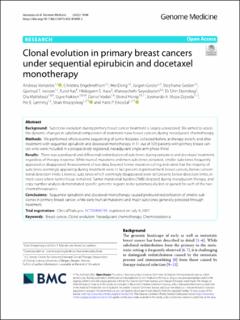Clonal evolution in primary breast cancers under sequential epirubicin and docetaxel monotherapy
Venizelos, Andreas; Engebrethsen, Christina; Deng, Wei; Geisler, Jürgen; Geisler, Stephanie; Iversen, Gjertrud Titlestad; Aas, Turid; Aase, Hildegunn Siv; Seyedzadeh, Manouchehr; Steinskog, Eli Sihn Samdal; Myklebost, Ola; Nakken, Sigve; Vodák, Daniel; Hovig, Eivind; Meza, Leonardo Zepeda; Lønning, Per Eystein; Knappskog, Stian; Eikesdal, Hans Petter
Journal article, Peer reviewed
Published version

Åpne
Permanent lenke
https://hdl.handle.net/11250/3040238Utgivelsesdato
2022Metadata
Vis full innførselSamlinger
- Department of Clinical Science [2318]
- Registrations from Cristin [9791]
Sammendrag
Background
Subclonal evolution during primary breast cancer treatment is largely unexplored. We aimed to assess the dynamic changes in subclonal composition of treatment-naïve breast cancers during neoadjuvant chemotherapy.
Methods
We performed whole exome sequencing of tumor biopsies collected before, at therapy switch, and after treatment with sequential epirubicin and docetaxel monotherapy in 51 out of 109 patients with primary breast cancer, who were included in a prospectively registered, neoadjuvant single-arm phase II trial.
Results
There was a profound and differential redistribution of subclones during epirubicin and docetaxel treatment, regardless of therapy response. While truncal mutations and main subclones persisted, smaller subclones frequently appeared or disappeared. Reassessment of raw data, beyond formal mutation calling, indicated that the majority of subclones seemingly appearing during treatment were in fact present in pretreatment breast cancers, below conventional detection limits. Likewise, subclones which seemingly disappeared were still present, below detection limits, in most cases where tumor tissue remained. Tumor mutational burden (TMB) dropped during neoadjuvant therapy, and copy number analysis demonstrated specific genomic regions to be systematically lost or gained for each of the two chemotherapeutics.
Conclusions
Sequential epirubicin and docetaxel monotherapy caused profound redistribution of smaller subclones in primary breast cancer, while early truncal mutations and major subclones generally persisted through treatment.
